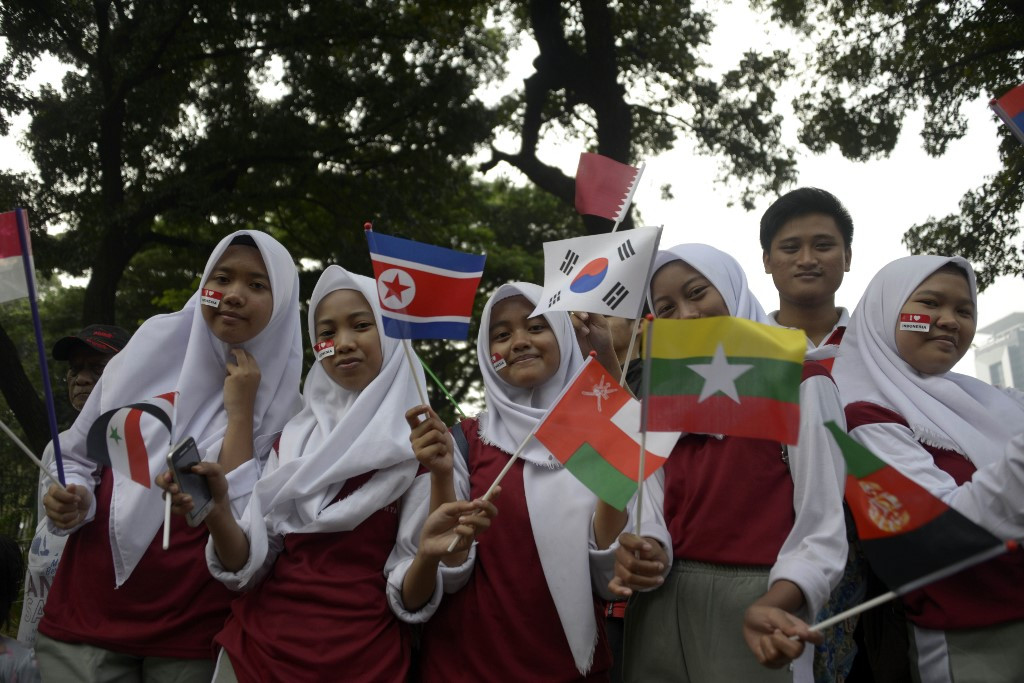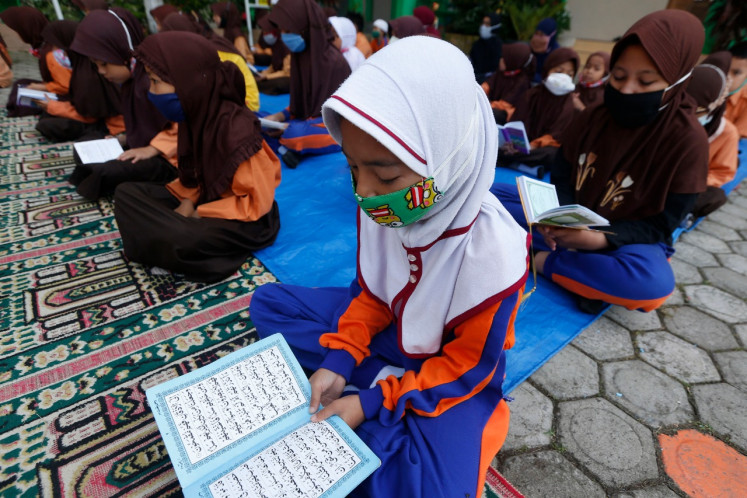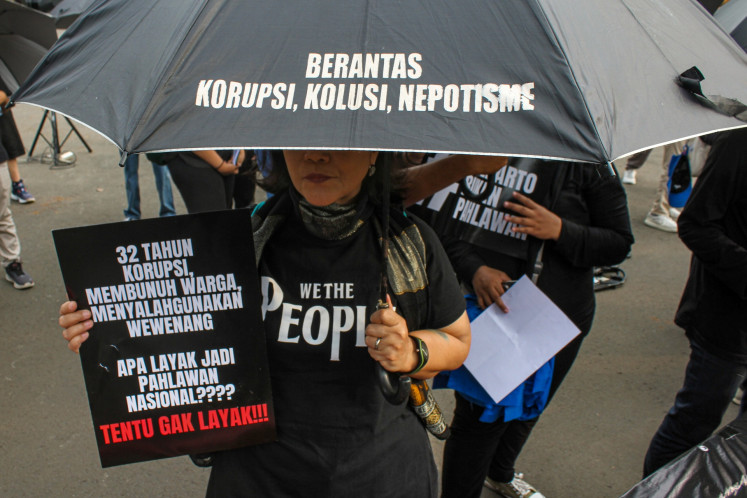The Hijab’s Tale: Mothers and daughters reflect on Padang mandatory hijab rule controversy
We asked mothers and daughters in various parts of Indonesia to weigh in on hijab rules at schools in the wake of the controversy surrounding the mandatory hijab rule policy — including for non-Muslims — at a state school in Padang, West Sumatra.
Change text size
Gift Premium Articles
to Anyone

E
very morning, Fathiya Sabila, 17, places a scarf over her head with its two corners draped over her shoulders and folds it into a triangle to cover her chest.
“Then I will bid farewell to my parents and go to school,” said Fathiya, who attends SMAIT Cordova, a private Islamic high school in Tangerang, Banten.
Fathiya started wearing a hijab in third grade and never once felt forced.
“Muslim girls are obligated to wear a hijab because that is Allah’s rule when you come of age. Period,” she said.
In contrast, Karra Lupita, a 28-year-old video editor in Jakarta, never wore a hijab as a student nor plans to do so as an adult.
“I don’t think I will [wear a hijab]. That’s just not me,” said Karra, who is Muslim but like many, attended Catholic private schools.
Karra’s father initially wanted to enroll her in Islamic elementary school Al-Azhar but ultimately chose Catholic elementary school Marsudirini since it was more affordable.
Later, she entered Catholic high school Tarakanita, although this time it was a personal choice.
“Attending non-Muslim schools made me more open-minded. I learn more about appreciating diversity,” she said.
Mothers and hijabs
“As a mother, I do sometimes feel bad seeing children wearing hijabs,” said Vira, 39, a mother in Aceh, commenting on religious attire policies in schools in her region.
She asked for her and her two daughters—Rayyan, 15, and Sofie, 14—to be referred to by their first names only. Both daughters have worn hijabs since elementary school. Rayyan is about to enter high school at a local madrasah (Islamic school), while Sofie is a second grader at a local junior high school.
While pre-school girls wearing hijabs are a common sight in Aceh, Vira would allow her daughters to take off their headscarves when they were younger.
“Girls are only required to wear a hijab when they begin menstruating anyway. For small children, wearing a hijab can be unbearable because of the heat,” she said.

Vira herself is quite open-minded when it comes to her daughters and hijabs. She does not mind if one day in the future, Rayyan or Sofie decide to take off their veils.
“As long as they’re able to be responsible for themselves, they have the right to decide what’s best for them,” she said, smiling.
While Vira took a softer approach for her daughters, Santi Suarni, 45, a teacher and a mother of five in Solok, West Sumatra, made her two daughters, one of them a kindergartener, wear hijabs whenever they go outside.
“So far they are okay with it,” she said about her daughters, aged 12 and 6.
Santi said it was not about “want” when it came to wearing a hijab for Muslim women. Should her daughters want to remove their veils as they grow older, such a request will be denied.
“If they still insist, I will direct them and explain that wearing a hijab is better than the opposite. Maybe in the beginning they will feel slightly forced, but in time they will be comfortable,” said Santi.
In Bekasi, Dita Pranandia, 32, said that while her 8-year-old, Sadiya Fatima, had worn a hijab since kindergarten, she would not force her daughter once she became an adult.
“Of course, personally I will be sad… but when [my daughter] becomes an adult, she can choose for herself,” said Dita, who only recently started wearing a hijab.
Padang hijab debacle
Recently, SMK 2 state vocational high school in Padang, West Sumatra, was criticized after news circulated that it punished a non-Muslim student for refusing to wear a hijab during an online class.
Although she loved wearing a hijab and encouraged Muslim women to wear a hijab, Fathiya said everybody should tolerate differences.
“People have different beliefs,” she said.
Karra was saddened upon hearing the news because as a Muslim student in Catholic schools, she always felt respected and appreciated by her peers and educators such as during Ramadan, when they would be careful when eating or drinking in front of her.
“As a Muslim myself, I would not like to be forced to wear a hijab as a student. So I can’t imagine how non-Muslim students would feel.”
Petracia Armani, 16, a Christian who attended a public school in Jakarta, said that neither she nor any of her friends experienced coercion to wear a hijab from classmates, teachers or their headmaster.
“[What happened in Padang] was a violation of human rights,” said Petracia, a Christian.
Petracia’s sentiment was echoed by Tena Handarini, a 35-year-old housewife and musician in Jakarta, who attended an Islamic high school but stopped wearing a hijab after she graduated.
“Only Islamic schools have a mandatory hijab rule, not public schools or state ones,” said Tena, whose parents were from Bukittinggi, West Sumatra.
Vira was confused because although Aceh is the only province that enforces Islamic law in criminal matters, she personally never saw such problems when it comes to hijabs and non-Muslims.
“I have non-Muslim friends such as ethnic Chinese for example and they never once were forced to wear a hijab,” she said.
Vira’s daughter, Sofie, who started wearing a hijab regularly in fourth grade, said she had never seen her non-Muslim peers wearing a hijab, let alone being forced to do so.
Santi, who teaches at an Islamic boarding school, said while she disagreed with forcing non-Muslims to wear a hijab, it should be noted that each school has its own regulations and West Sumatra is a Muslim-majority province.
Santi recommended non-Muslim students and their parents who did not wish to follow mandatory hijab rules at public schools in West Sumatra to register at other schools that did not enforce such a rule, such as non-Islamic private schools.
“It’s understandable [for public schools in West Sumatra] to enforce a hijab rule because for me, non-Muslim students will be very noticeable [if they are not wearing a hijab] and that can make them feel uncomfortable,” said Santi.
Vira’s eldest daughter, Rayyan, strongly disagrees that wearing a hijab should be mandatory in state schools.
“If a state school wants to do that, they might as well transform itself into a madrasah,” said Rayyan.
“Forcing non-Muslims to wear a hijab is simply wrong.”
We asked Dita to quiz her daughter on the topic of the hijab. The child’s answers were recorded in voice notes and were later sent to us.
“I like [wearing a hijab]. It doesn’t matter [if it’s hot] because it’s Allah’s order. I disagree [if my non-Muslim friends were forced to wear a hijab]. We all have different religions.”









